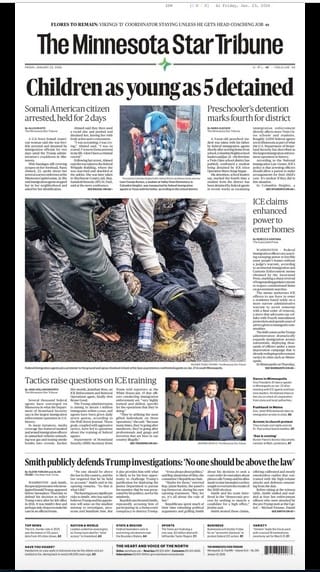Rights at Risk: What Is Your Value to the Nation?
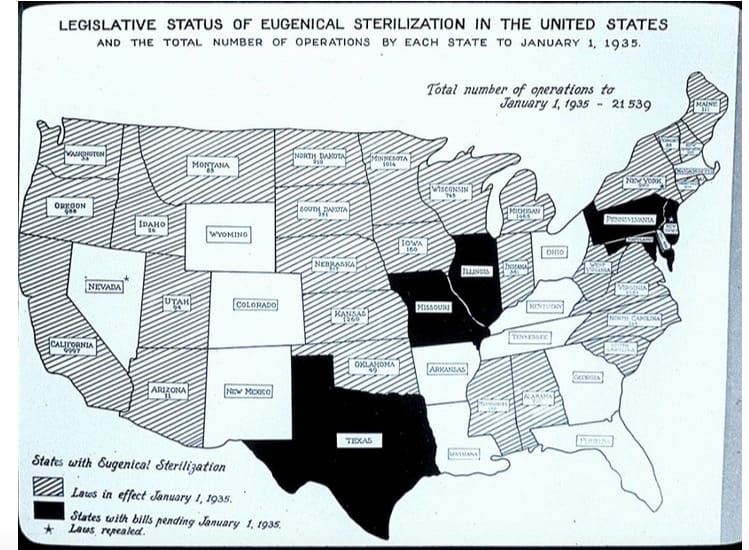
"The moment an individual’s fundamental rights are subjected to a simple cost-benefit analysis is the moment the gates of hell open wide." Stephen Unwin, "Life Unworthy of Life: The Lessons of T4"
I keep adding to my Learn, Imagine, Act resource list. Current events have increased my curiosity about the ties linking education, immigration policy, medicine, and eugenics in United States history. As a result, I'm learning deeply disturbing things about our past. I'm also seeing alarming signs that the legacy of eugenics is alive and well in our present. At its core, it lives within white supremacist beliefs about which humans are considered of enough "value" to be deemed worthy of rights, and even of life.
Many of us have trusted that such beliefs were overturned decades ago, or legislated away into impotence (though as with racism, we're likely to have unconsciously internalized certain aspects). Many find it difficult to recognize these beliefs when they occur in the subtext—and lately, the overt text—of views expressed by politicians, influencers, and their followers. Some simply cannot grasp that a century old pseudo-science can possibly be part of today's politics. It is. Our ignorance and incredulity are helping enable it.
It is urgent that we recognize and resist this warped value system. That means fully confronting an ugly side of our nation's character. As my June 6 post about eugenics discussed, our country shares this ugliness with a few others (see that post's link to Ben-Ghiat's article on fascist population engineering). But the U.S. government is now hard at work, deleting much of the historic evidence.
Here's a case in point, relevant to my post last week about George Takei and the internment of Japanese Americans. Widespread efforts are afoot to change the historical record presented at parks and museums—

For every schoolchild of my generation, the Nazis were held up as the most notorious example of eugenic thought and practice. However, in my education, their targeting of the disabled was treated almost as a footnote, mentioned in a list of other non-Jewish victims such as dissidents, gays, and Romani people.
In "Life Unworthy of Life: The Lessons of T4", Stephen Unwin writes that "although eugenics was created in London and enthusiastically nurtured in America and Scandinavia, it was in Nazi Germany that it found its most appalling realisation. Indeed, the persecution, forced sterilisation and subsequent murder of as many as 275,000 “useless eaters” is one of the most overlooked chapters in the whole ghastly history of the Third Reich."
Unwin further traces the lines of influence, and again, the numbers are mind-boggling:
The Germans were much influenced by the American eugenicists, and the Rockefeller Foundation bankrolled the new Kaiser Wilhelm Institute in Berlin (where Josef Mengele worked before being transferred to Auschwitz). C. M. Goethe, the wealthy leader of the California Genetics movement, was delighted to learn that, within a year of Hitler coming to power, 5,000 Germans a month were being forcibly sterilised, and praised a fellow eugenicist for helping to shape “the opinions of the group of intellectuals who are behind Hitler in this epoch-making programme”.
Similarly, the virulent American eugenicist, Harry H. Laughlin (himself epileptic), boasted that his Model Sterilisation Law had been adopted by the Nazis in their 1935 Racial Hygiene Law, while one American asylum director expressed concern that “the Germans are beating us at our own game”.
I recommend reading Unwin's article in its entirety, as he powerfully calls our attention to this "overlooked chapter":

Many of these Nazi eugenics perpetrators went unpunished or were only briefly incarcerated. Unwin suggests a partial explanation for this: "as the disabled actress and artist Liz Crow puts it, the Nuremberg prosecutors 'were confused about whether killing disabled people was a public service. The prevailing attitudes about disabled people, that they were inferior, pitiable and burdensome, defined their judgement.'”
The eugenicists' crimes truly did seem to be overlooked. Some returned to successful and influential careers, much as the Nazi billionaires did (see post #5). Edith Sheffer's Asperger's Children: The Origins of Autism in Nazi Vienna provides a stunning account of this. In upcoming posts I will consider Sheffer's book more fully, as well as how eugenics-based values have slipped into common language—for instance, this week Eric Trump called the L.A. protestors "mongoloids." But today I want to share a couple of relevant historic and modern examples, to set the stage for those future posts.
Categorizing people, purportedly through objective science, was a fundamental exercise in shaping policy in early twentieth century America. Explicit in these categories were value judgments about the role people could fulfill as workers. This 1915 staircase of feeble-mindedness is a notable example:
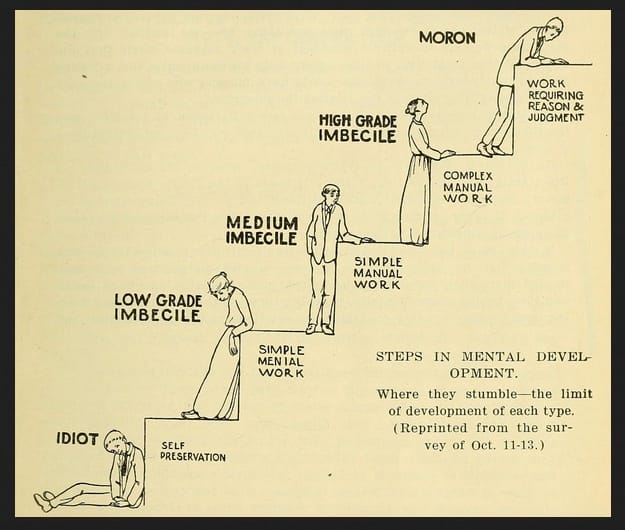
"This illustration, meant to depict E. R. Johnstone’s classifications of what he defined as “feeble-minded” people, appeared in the 1915 report Mental Defectives in Virginia, issued by the State Board of Charities and Corrections. The image depicts five different levels of the “feeble-minded,” next to steps indicating what work they are capable of completing . . . . The report recommended segregation and sterilization of the feeble-minded. " (https://encyclopediavirginia.org/mental-defectives-in-virginia-illustration/ Credit: Internet Archive and Brandeis University Libraries)
RFK Jr's recent statements about children with autism are freighted with similar value judgements: "And these are kids who will never pay taxes, they’ll never hold a job, they’ll never play baseball, they’ll never write a poem, they’ll never go out on a date. Many of them will never use a toilet unassisted.” How his portrayals actually compare with the facts is covered here:

" . . . we need to stop assessing people by their productivity and earning ability, and start to create a new sense of community and belonging. That will require a reshaping of our entire system of values, wherein we stop regarding intellectual achievement as the single most important quality a human being can have." Stephen Unwin
Colby College emeritus history professor Paul Josephson's piece below places Kennedy's pronouncements in the context of eugenics better than I can:
https://www.commondreams.org/opinion/rfk-jr-hhs-eugenics
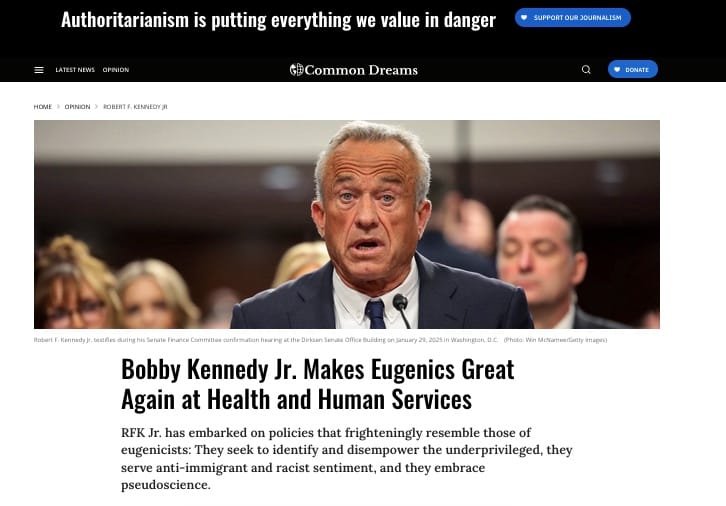
It should be noted that Kennedy's plans for an autism registry/database have raised such concern that Illinois Governor Pritzker issued this executive order in May (see full text at link):
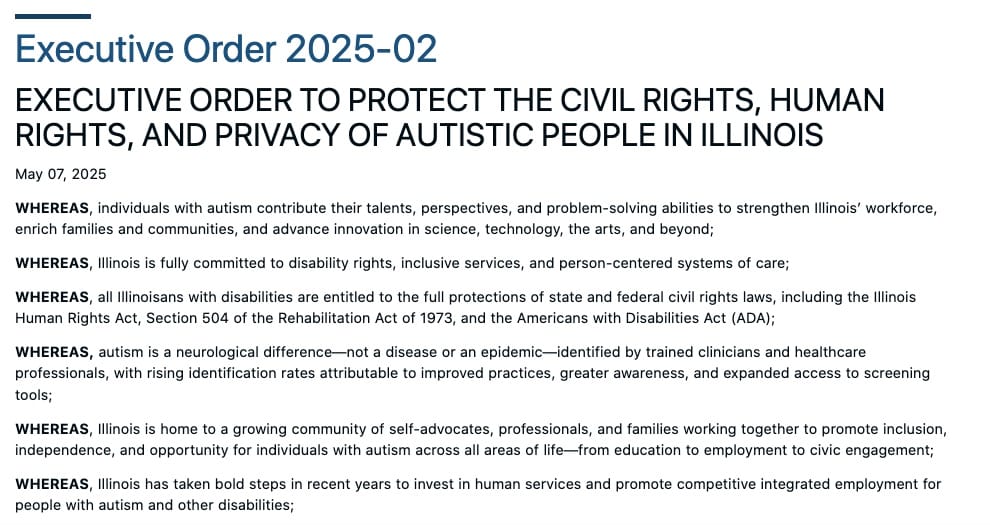

Though in this instance he is more focused on the dangers of "othering" through claims of "foreignness" rather than ableism, Governor Pritzker's recent warning is worth heeding, :

If you've made it this far, congratulations—it's a tough topic. Thank you for being here, helping us face this together. I'd love to hear your thoughts on the subject.
Here's one more resource if you'd like to know more about the history of U.S. sterilization, and its continuation into this century. This site offers a number of documentary films to go with the textual information:









